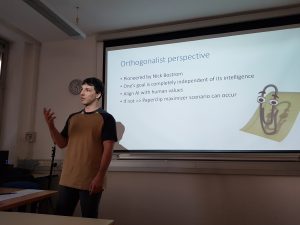PRESENTERS:
Uroš SERGAŠ,
PhD student in Computer Science and teaching assistant at UP FAMNIT;
Jar Žiga MARUŠIČ,
PhD student in Philosophy at UL FF and teaching assistant at UP FAMNIT;
TITLE:
The AI alignment problem and its implications for society
ABSTRACT:
Humanity has again found itself on the brink of a new era, as large language models (LLM) seem poised to bring about important social changes. As these models advance in complexity, the issue of AI alignment is gaining popularity in a daily conversation topic.
This research explores two contrasting viewpoints on the AI alignment problem: the Orthogonalist perspective pioneered by Nick Bostrom and the Anti-orthogonalist critique formulated by Nick Land. The former posits that an AI’s goals are independent of its intelligence, suggesting that a “friendly AI” (fully aligned to human values) is possible. The latter challenges its separation of intelligence and values from the perspective that intelligence increase leads to a greater ability for self-reflection, ultimately leading to a restructuring of its value structure to prioritize further cognitive enhancement. We discuss the implications of these ideas and highlight the current patterns seen in the developments of widely available AI tools, such as LLM.
ABOUT THE PRESENTERS:
Uroš Sergaš is a PhD student in Computer Science at UP FAMNIT, Jar Žiga Marušič is a PhD student in Philosophy at UL FF. Both are also teaching assistants at UP FAMNIT, Uroš in the Department of Information Sciences and Technologies, Jar in the Department of Psychology. Together they are interested in the implications and uses of artificial intelligence in society. Over the summer they researched the AI alignment problem.


